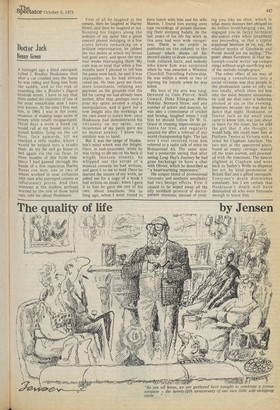Doctor Jack
Benny Green
A fortnight ago a blind osteopath called J. Bradley Hoskisson died after a car crashed into the horse he was riding and flung him from the saddle, and at the risk of sounding like a Reader's Digest bromide mixer, I have to say that there ended the existence of one of the most remarkable men I have ever known. At the time I first met him, in 1964, I was in the ironic situation of making large sums of money while totally incapacitated. Three days a week a hired car would call at my house; into it I would hobble, lying on the car • floor, face upwards, till we reached a telly studio, where I would be helped into a studio chair, do my bit and go home to bed again via the car floor. In three months of this futile existence I had passed through the hands of a few rapacious. Harley Street con men, one or two of Whom worked in neat collusion With men who purveyed corsets at inflationary prices. And then someone at the studios, perhaps worried by the cost of those hired cars, told me about Hoskisson.
First of all he laughed at the corsets, then he laughed at Harley Street, and then he laughed at me. Running his fingers along the nodules of my spine like a great concert pianist indulging in a few scales before embarking on a brilliant improvisation, he jabbed the two points at which my bones had gone awry, and spent the next four weeks rearranging them. My cure was so total that when a few months later I phoned to tell him the pains were back, he said it was impossible, as he had already cured me. He then gave me three more treatments, refusing any payment on the grounds that the bill for curing me had already been settled. After that, perhaps once a year my spine needed a slighl manipulation, and it gave me a new insight into the workings of my own mind to notice how, once Hoskisson had demonstrated his virtuosity on my spine, any recurrence of my pains gave me no mental anxiety. I knew the antidote was to hand.
But it was the range of Hoskisson's mind which was the delight, Once, in mid-treatment, while he was trying to lift me on his back (I weight thirteen stones), he whipped out the script of a musical comedy he had written, and gave it to me to read. Once he learned the nature of my work, he asked me for a copy of a book I had written on music; when I gave it to him he gave me one of his own, about loneliness. Not so long ago, when I went round to have lunch with him and his wife Marion, I found him poring over tape recordings of people discussing their sleeping habits. In the last years of his life his work in this area had won wide recognition. There is an article he published on the subject in the Listener which shows all his shrewd ability to draw conclusions from collated facts, and nobody who knew him was surprised when he was awarded a Winston Churchill Travelling Fellowship. He was within a week or two of starting his travels when he was killed.
His love of the arts was total. Devoted to Cole Porter, NoUl Coward, Duke Ellington, Billie Holiday, Bernard Shaw, and any' number of actors and dancers, he was also a connoisseur of cricket and boxing, laughed when I told him he should follow Dr W. G. Grace in treating impecunious patients for free, and regularly quizzed me after a telecast of any world championship fight. The last note I ever received from him referred to a radio talk of mine on Muhammad Ali. The same note had a postscript saying that after seeing Long Day's Journey he had gone backstage to have a chat with Olivier, which he described as "a heartwarming experience."
His unique blend of professional virtuosity and aesthetic sensibility had two benign effects. First it caused to be wiped away all the silly snobbish protocol of doctorpatient relations; instead of treat ing you like an idiot, which is what many doctors feel obliged to do before overcharging you, he engaged you in fierce technical discussion even while treatment was proceeding, so that a typical argument between us on, say, the relative merits of Gershwin and Porter would see me saying, "The point about Gershwin is that hehumph-could write up-te.mpo songs without-argh-sacrificing any of the melodic-himph-grace."
The other effect of his way of turning a consultation into a social occasion was that people in the professions came to rely on him totally, which often led him into the most bizarre situations. He told me that once a ballerina phoned at six in the evening, desperate because she was due to dance that night. Hoskisson, or Doctor Jack as my small sons came to know him, was just about to leave for the coast, but he told the girl that if she thought it would help, she could meet him at Platform Twelve at Victoria with a ticket for Clapham Junction. The two•met at the appointed place, found an empty carriage, waited till the train started, and proceeded with the treatment. The dancer alighted at Clapham and went back to Sadler's Wells to dispense her art, by kind permission of British Rail and a gifted osteopath. Everyone's death diminishes somebody, but I am certain that Hoskisson's death will have diminished all who were fortunate enough to know him.


































 Previous page
Previous page